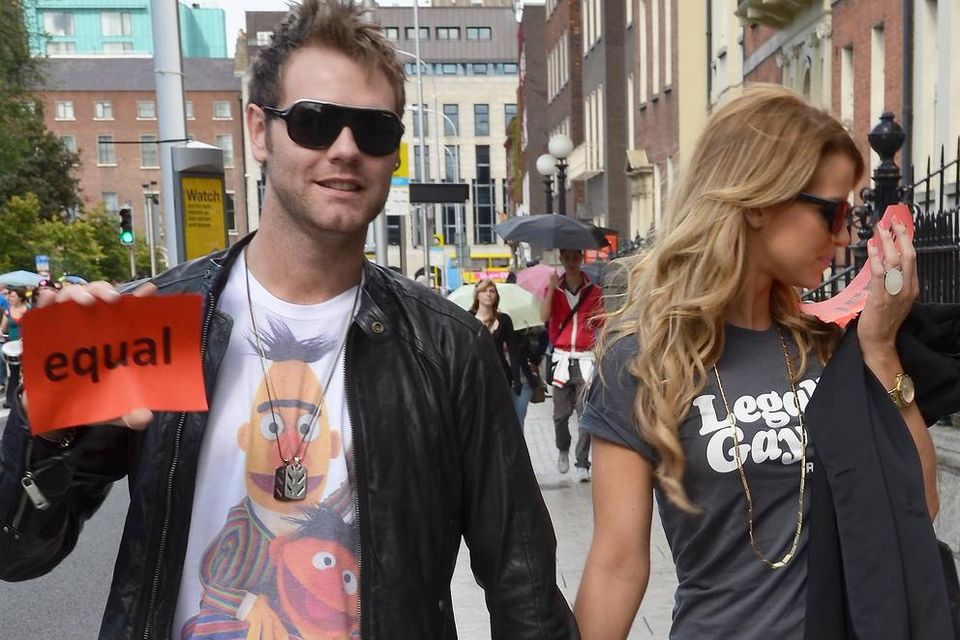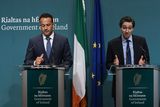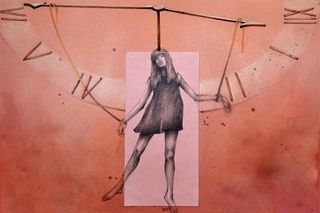Gay marriage debate is polarised - but the victors are setting the tone
Marriage Equality advocates, bruised from their past experiences, are on alert for abuse that has yet to surface
The couple march in the protest rally, 'Get Equal', looking for gay civil marriage rights in Ireland, in support of Vogue's sister Amber, who is gay.
I process things slowly. That I'll admit. So it wasn't until I was interviewing Kieran Rose, from the Gay and Lesbian Equality Network, (GLEN) on Newstalk last weekend, that the penny finally dropped. We were discussing recent rulings made by the Broadcasting Authority of Ireland (BAI) against RTE and Newstalk. Rose began to talk about a Prime Time show on RTE in 1993 when homosexuality was being decriminalised. (Can you believe that was only 1993?).
He'd been invited on to discuss the proposed legislation and described how he and other gay rights activists were put in a room with conservatives. I haven't seen it, but from Rose's description, those opposed to decriminalisation said some pretty nasty things. I could see he was still terribly wounded by the experience and my heart went out to him. And that's when I finally got it. It was over 20 years ago, but he's still back there and he's terrified the same thing will happen this time. It explains a lot.
I've been watching the gay marriage debate bewildered by the hysterical behaviour of some gay rights activists. From the Rory O'Neill episode when he lashed out at the Iona Institute and John Waters, to the BAI ruling that presenters, in the absence of any other opposing view, breach the BAI code regarding balance by adding their own supporting views when interviewing gay couples which, people told me, was the work of a right-wing Catholic agenda! Others have demanded that the entire debate needs to be monitored to prevent abuse of gay people and actually, simply having the conversation at all is a form of victimisation - an approach that wouldn't have served civil rights activists from Martin Luther King to David Norris very well.
When I argued that Waters was right to defend himself against charges of homophobia, friends of mine attacked me via text and email. I'm not on Facebook but I was assured I was getting a killing there too - by people who know me. Simply by pointing out the black-and-white legal issues at stake, they assumed I was against gay marriage, even though I wrote my first column supporting gay couples eight years ago. In fact, when I told a friend I was writing this piece, he instantly warned, "Be careful". Anyone who sticks their oar in risks attack - and not from the Iona Institute. Amid all the talk of "chilling effects" I was the one crying reading an email from a good friend who was so enraged he couldn't tell whose side I was on.
It's not 1980. Neither is it 1993. It's 2014 and the war is over. Polls have repeatedly shown there is an overwhelming majority who support gay marriage. The referendum will be a walkover. There is no vast right-wing conspiracy. There's a very small right-wing conspiracy but it isn't doing very well, is it? The Iona Institute represents a minority of people and is entitled to do so. But it has lost every issue on which it has campaigned. Children's referendum. Pregnancy in Life bill. Gay marriage. They've got a constituency, but they're hardly a threat.
So what's the panic about? Ireland has moved on, but the activists haven't. I completely understand why someone like Rose who was directly involved in those bad times is worried, and to be fair he agreed his worst fears have not been realised. To those still concerned, look at it this way: conservatives have been leveraging the BAI system, which responds only to specific complaints. If conservatives complain about items that are entirely in favour of gay marriage and in which the presenters themselves declare their support for the referendum, why don't gay activists complain when they hear interviews that are biased against gay marriage? The simple answer is they can't, because there isn't the slightest chance of such a conversation ever taking place. There's a consensus, and it's on their side.
It's not 100pc and it doesn't mean that the genuine concerns of people about the parentage of children, which apply equally to infertile straight couples, shouldn't be listened to with respect. I live in rural Ireland and I know that the mostly older people who gingerly express reservations about gay marriage out of genuine concern for the future of children aren't homophobic. On the contrary, they recognise now that providing babies to childless couples with the best of intentions created terrible unforeseen problems. They're just asking the questions now they know they should have asked a long time ago.
To gay activists who argue that simply having this debate is victimisation, they need to recognise that so far all the name-calling has come from their side; bigot being a particular favourite. They should also acknowledge that the rampant homophobia in society isn't a product of anything heard in churches since the mass-attending population is pretty old and as an occasional mass-goer, the only sermons I hear are about tolerance, not judgement.
On the other hand, my children came home from school when they were just six, asking what gay meant because they'd heard it being thrown around the school yard as an insult. A friend of mine was walking down a Dublin street - a la Rory O'Neill - when a car zoomed past and drunken youths threw drink at him shouting "Queer!" Except my friend wasn't gay. So the whole "How Did They Know?" refrain from O'Neill's Abbey speech is rather moot. They didn't know. Homophobic abuse on this level is part of a deeply ignorant popular culture that might be a legacy of a religious culture but has almost no relevance today.
Obviously, it needs to be crushed as no one should be exposed to such unthinking hatred. Coming out to oneself, to one's family and into an aggressively sexualised society is still a tough experience from which I know some of my friends have never really recovered. From an early age, I was taught by my parents to challenge bullying, including homophobic bullying, and that's what I've warned my children to do. Passing the referendum will help with this school-yard culture, but only a little.
But I think it's time some people in the gay rights community need to really ask themselves if they are being bullied by conservatives in the gay marriage debate. If so, where? When? Because what I see are gay men and women terribly damaged by their experiences who are lashing out - and in so doing are losing votes. The Marriage Equality campaigners should sail serenely through the next few months; be generous with their approach and answer genuine questions of concern without calling anyone 'bigot' or 'homophobe'. I think the slavery as moral progress comparison could also be left outside the door. They've won so they set the tone. This debate should be about healing wounds, not creating new ones.
Join the Irish Independent WhatsApp channel
Stay up to date with all the latest news















